AI in healthcare: a quiet revolution about to get loud
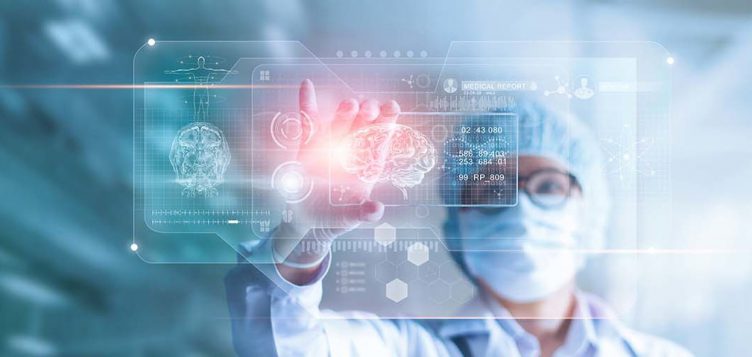
How artificial intelligence (AI) is set to transform the global healthcare industry.
By Fady Jameel, Deputy President and Vice Chairman, Abdul Latif Jameel.
Welcome to my second ‘Spotlight’ article, where I’d like to explore another of our biggest challenges, and one I am passionate about.
Around the world, industries and professions are facing upheaval and disruption on an extraordinary scale. The advance of artificial intelligence (AI) looks set to pose questions that go to the heart of 21st-Century society: workforces are being reorganized, jobs restructured and working patterns reimagined.
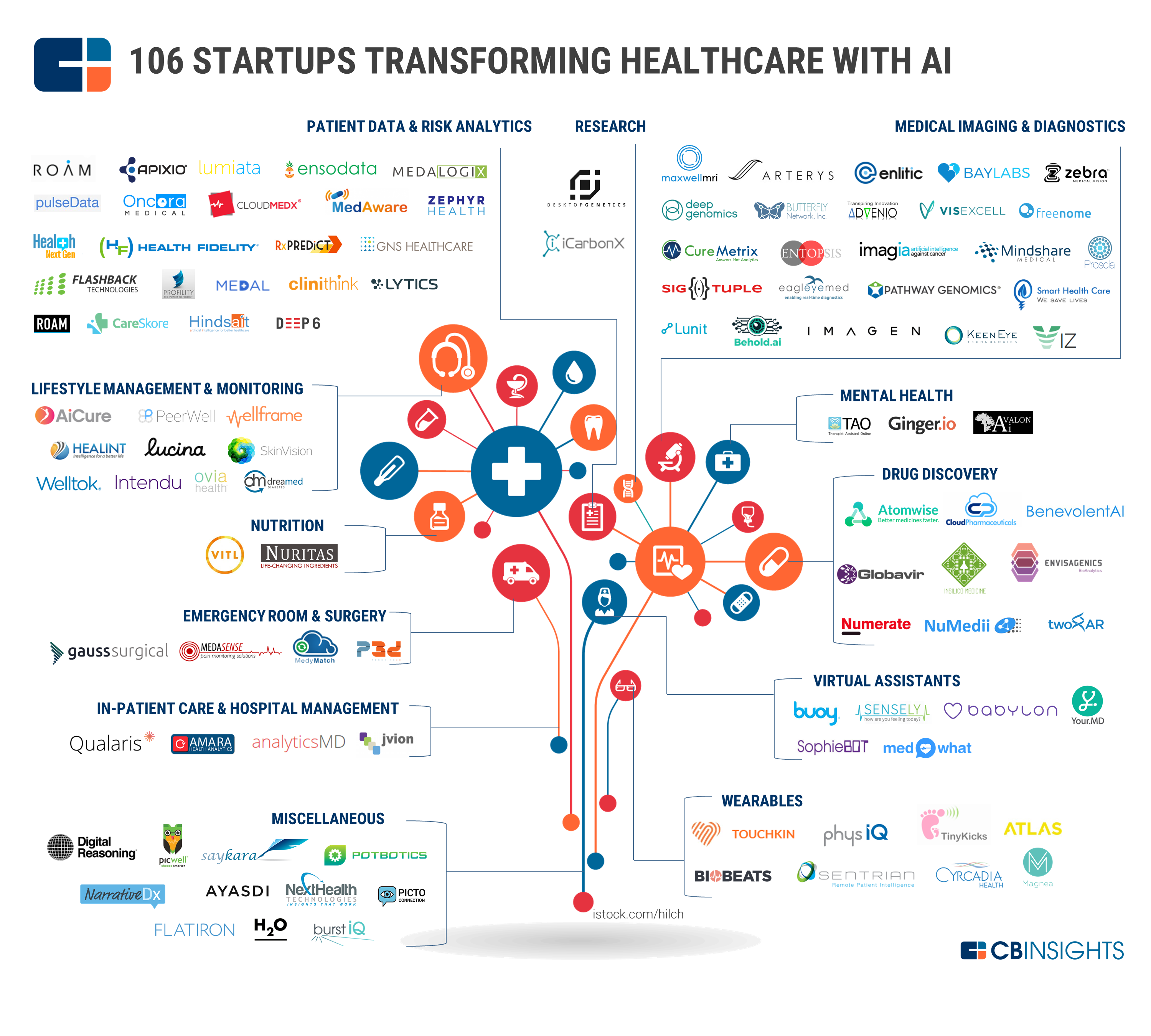 But what, exactly, is AI? While it is a term that can be difficult to define, a common interpretation is “computers and computer software that are capable of intelligent behavior, such as analysis and learning”.[1] And while its precise definition may be up for discussion, one thing is universally accepted: AI will have a truly transformative impact on healthcare. According to technology and big data consultancy, CB Insights, “nearly every area across the [healthcare] industry will be impacted by the technology’s rise”.[2] Indeed, 2016 saw some 106 start-ups entering this transformative space.
But what, exactly, is AI? While it is a term that can be difficult to define, a common interpretation is “computers and computer software that are capable of intelligent behavior, such as analysis and learning”.[1] And while its precise definition may be up for discussion, one thing is universally accepted: AI will have a truly transformative impact on healthcare. According to technology and big data consultancy, CB Insights, “nearly every area across the [healthcare] industry will be impacted by the technology’s rise”.[2] Indeed, 2016 saw some 106 start-ups entering this transformative space.
AI’s key advantage is being able to analyze huge quantities of data at a speed far quicker – and often with far greater accuracy – than any human could ever hope to achieve. It is this ‘data-crunching’ and deep analysis ability that will, inevitably, lead to extraordinary changes in the sector, both in private and indeed public health approaches.
Already, healthcare AI start-ups raised at least US$ 4.3 billion in funding[3] between 2013 and 2018. That figure surpasses every other industry making AI-related deals. By 2024, Morgan Stanley estimates the global market for AI in healthcare could reach US$ 10 billion.[4]
Changes underway
Today, the first signs of AI’s impact in healthcare are already becoming apparent – and the potential advances available are significantly greater than anything delivered in recent decades. But only the very surface has been scratched so far. “We are only at the beginning of seeing how it will impact patient care,” [5] says the UK’s Academy of Royal Medical Colleges.
A recent Accenture report estimated that the top 10 healthcare applications where AI could deliver the “greatest near-term impact” could save the US healthcare system alone US$ 150 billion per year by 2026.[6]
These applications include robot-assisted orthopedic surgery (savings of US$ 40 billion), virtual nursing assistants (US$ 20 billion) and dosage error reductions (US$ 16 billion). With figures like that, the transformative potential of AI in healthcare over the next 20 or 30 years is without precedent.
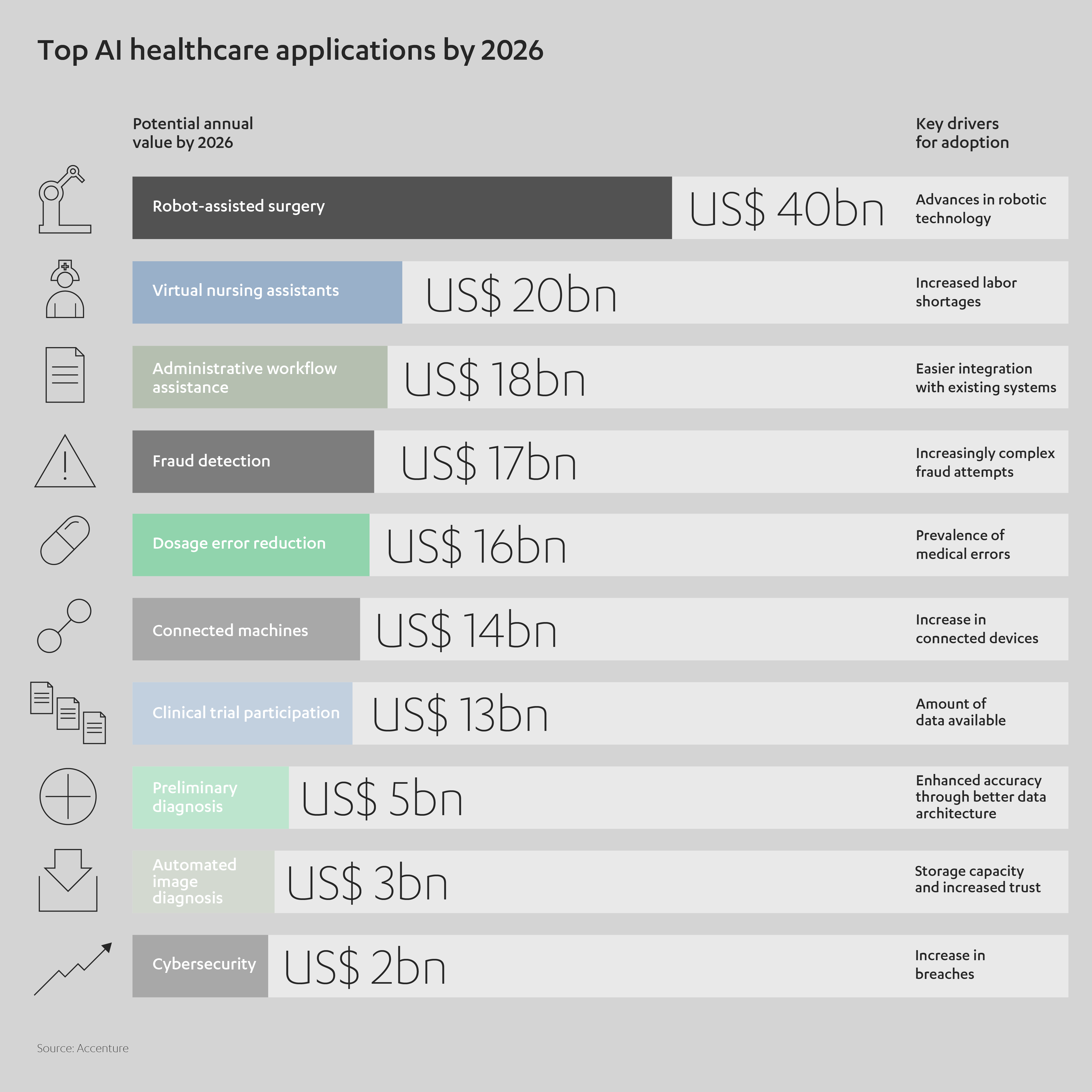
Assessing AI’s early impact
There are already countless early signs of what AI could achieve, with Google and its parent company Alphabet among those pushing for further development. As a statement of intent, it has made a string of significant appointments, including former Geisinger Health CEO David Feinberg as the head of its Google Health initiative.[7] It is developing a range of new technologies, such as using machine learning to forecast the “length of a patient’s hospital stay… and the likelihood of death”.[8] Elsewhere, Google’s DeepMind has taught machines to read retinal scans with at least as much accuracy as an experienced junior doctor.[9]
Other real-world interventions powered by AI include AI-assisted robotic surgery, which is no longer a futuristic sci-fi dream but an area of healthcare where AI is already delivering significant benefits. They include a 21% reduction in a patient’s hospital stay[10] and five times fewer complications compared to surgeons operating alone.[11]
In London, a DeepMind tool analyzes live health data to determine patients that may be at risk of a fatal loss of kidney function.[12] As early as 2017, the American Cancer Society was seeing AI being harnessed to review and translate mammograms with 99% accuracy and at 30 times the speed of humans – almost instantly eliminating the longstanding false result rate that saw one in two healthy women being told they have cancer.[13]
Machine learning is also being introduced in the assessment of embryo potential during in-vitro fertilization (IVF),[14] while researchers at University College Hospital in London suggest they have found a way to save up to GB£ 3 million per year after an algorithm assessing 22,000 patient appointment records successfully identified 90% of patients who would not attend their next appointment.[15]
AI can also help to manage staffing issues. Unlike human staff, virtual nursing assistants have the advantage of never tiring – even when working 24/7. They can already answer questions, monitor patients and provide quick answers.[16]
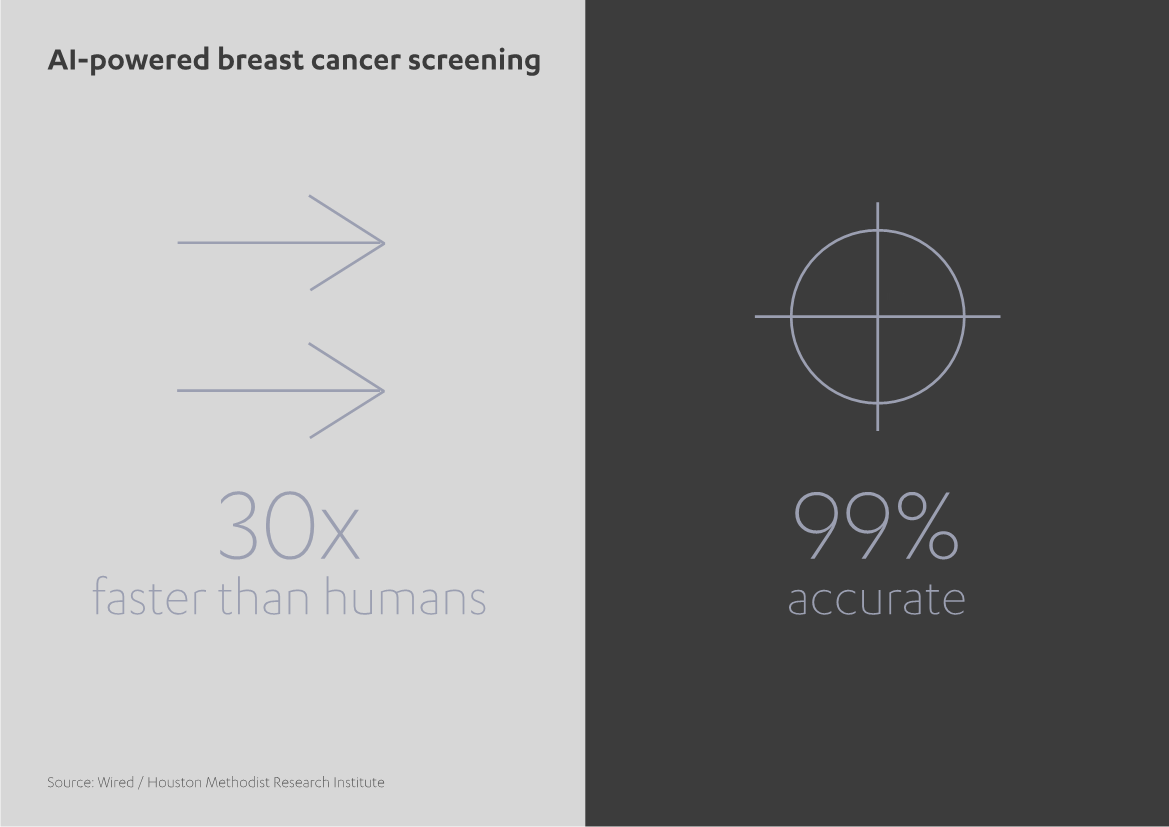
Image analysis is another field showing extraordinary space for AI-powered improvements.
Researchers at MIT have been part of a team that has developed an algorithm capable of analyzing 3D scans up to 1,000 times faster than humans.[17] Given the time-consuming nature of this work, this is a particularly striking advance.
There is also potential for voice-to-text translations to reduce the administrative burden facing doctors by automating the ordering of tests, the writing of notes and the prescribing of medicines.
What is coming next?
It is difficult to assess the pace of the current advances. For many, the potential impact of AI in healthcare appears to be arriving at a mind-boggling speed. Yet seasoned observers suggest the real change – and its accompanying benefits – is still to come.
The Academy of Medical Royal Colleges, which is the coordinating body for the UK and Ireland’s 24 medical royal colleges and faculties, says that “looking further into the future, AI systems may exhibit increasing autonomy and independence”.
Providing scope to cover for labor shortages is one impact expected over the next decade. By 2026, estimates in a recent Accenture report suggest that AI will address 20% of unmet clinical demand.[18] It will soon be able to help medical professionals with their decision-making by evaluating diagnostic images and creating treatment plans, before eventually progressing to tasks such as diagnostics without user input – although these advances are still thought to “remain far down the road”.[19]
Whatever vision the future holds, one thing is abundantly clear.
“AI is not an innovation coming down the pipe – it’s here. It’s in our call centers, our homes and now, in our healthcare. Those who seize the AI opportunity and embrace these applications to deliver high-quality, cost-effective care will be the ones to leapfrog competitors.”[20]
But we also need to consider the patient: the ‘consumer’. A 2018 Accenture analysis showed that change and the perceptions impacting rapid patient adoption of AI treatment are still uncertain, with issues of personal care and data security highlighted.
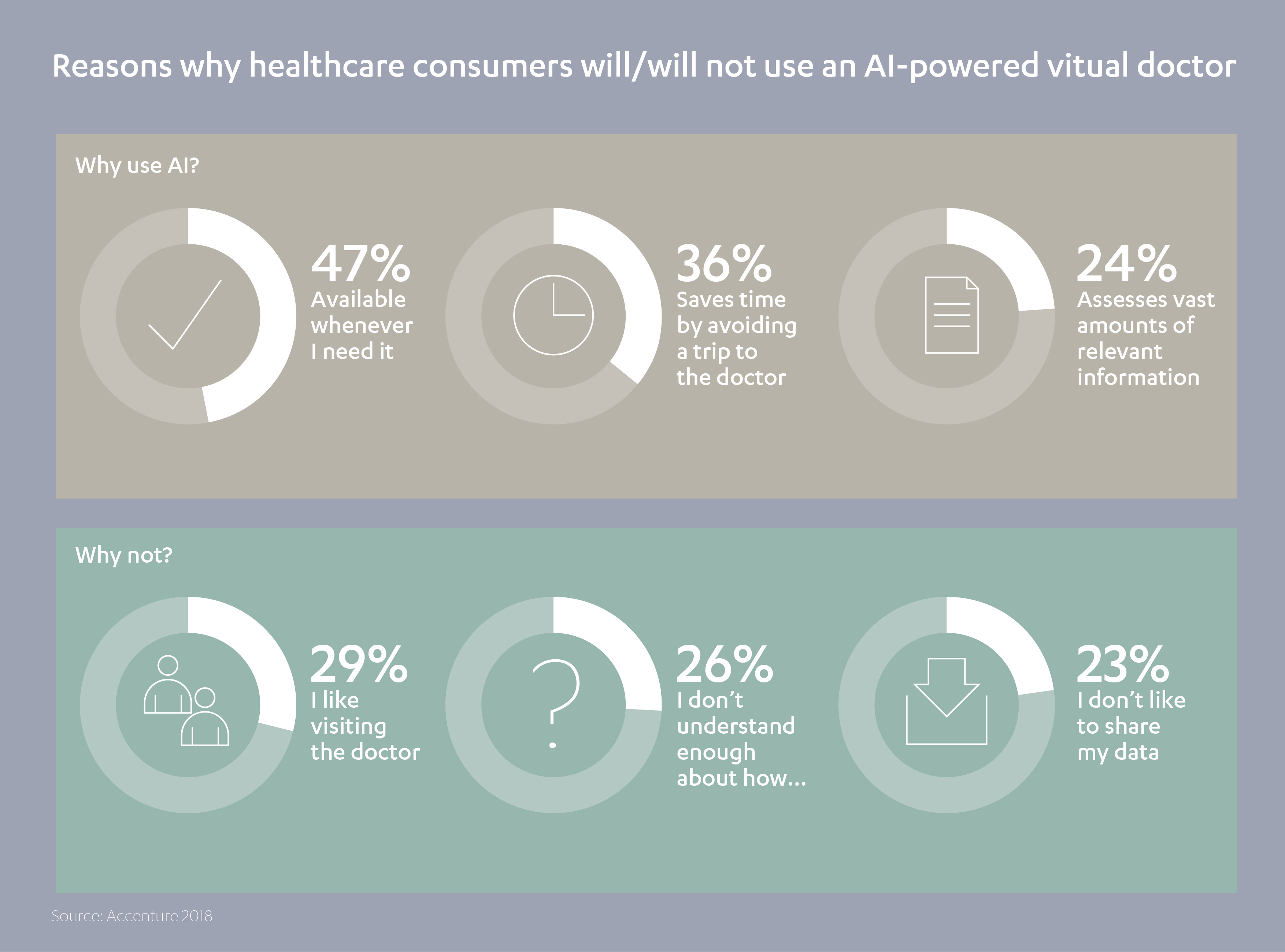
J-Clinic and its work
At the Massachusetts Institute of Technology (MIT), the Abdul Latif Jameel Clinic for Machine Learning in Health (J-Clinic) was established in late 2018, specifically to leverage the potential of AI to transform healthcare as we know it.
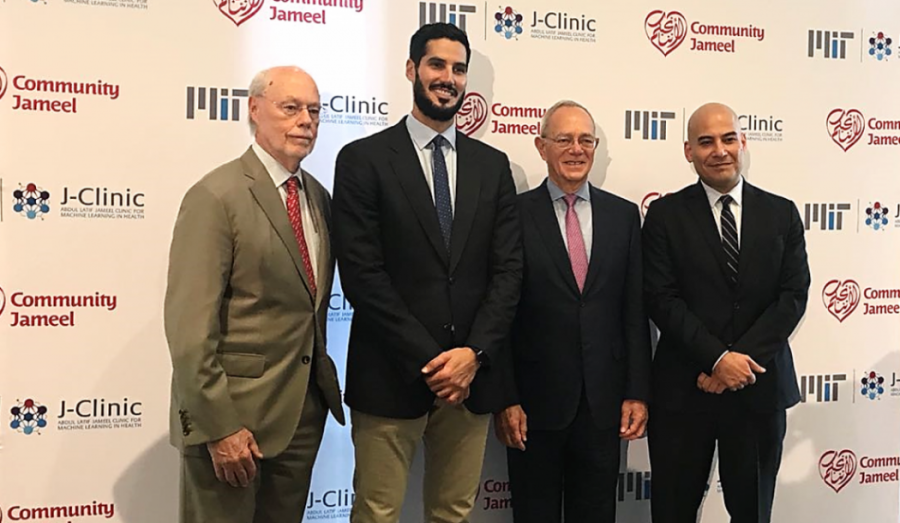 Left-to-Right: Philip A. Sharp, Chair, J-Clinic Advisory Board; Hassan Jameel, President Saudi Arabia, Community Jameel; Rafael Riff, MOT President and myself, Fady Jameel, President International, Community Jameel, at the MIT-J-Clinic launch event in Boston, September 2018.
Left-to-Right: Philip A. Sharp, Chair, J-Clinic Advisory Board; Hassan Jameel, President Saudi Arabia, Community Jameel; Rafael Riff, MOT President and myself, Fady Jameel, President International, Community Jameel, at the MIT-J-Clinic launch event in Boston, September 2018.
The fourth major collaborative effort between MIT and Community Jameel is a key part of the MIT Quest for Intelligence. It aims to harness AI and machine learning to revolutionize disease prevention, detection and treatment. Its remit includes:At the Massachusetts Institute of Technology (MIT), the Abdul Latif Jameel Clinic for Machine Learning in Health (J-Clinic) was established in late 2018, specifically to leverage the potential of AI to transform healthcare as we know it.
- Preventative medicine methods and technologies with the potential to change the course of non-infectious disease by stopping it in its tracks.
- Cost-effective diagnostic tests that may be able to both detect and alleviate health problems.
- Drug discovery and development to enable faster and cheaper discovery, development, and manufacture of new pharmaceuticals, particularly those targeted for individually customized therapies.
Two faculty co-Leads, Regina Barzilay and James Collins, oversee the day-to-day operations of J-Clinic. Among its work so far has been the development of a cryptographic system that could help neural networks identify promising drug candidates in massive pharmacological datasets;[21] a predictive model that could guide clinicians in deciding when to give potentially life-saving drugs to patients being treated for sepsis in the emergency room;[22] and a new machine-learning approach to discover an additional mechanism that helps some antibiotics kill bacteria.[23]
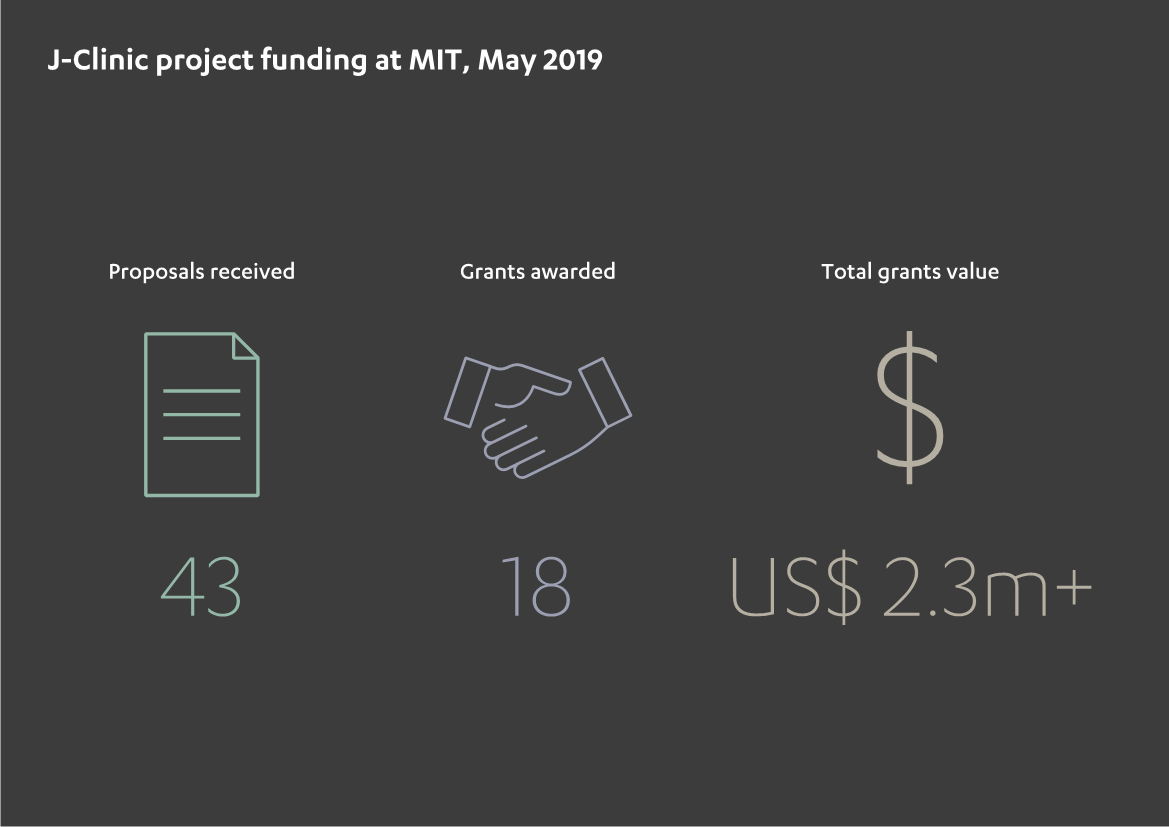
Ananthan P. Chandrakasan, Chair of J-Clinic, says the rise of AI in healthcare can deliver both short-term and long-term benefits.
“Certainly, it will streamline and make much more personalized healthcare possible. We will be able to track an individual’s data, understand it in relation to the wider population, and customize treatments more individually. That’s a very exciting opportunity.
“But ultimately, I’d love to see this technology looking at the prevention of diseases. These are the more futuristic opportunities… The first achievement is likely to be detection, then better treatment, then personalized treatment, and finally disease prevention. That’s our ultimate goal.”
In May 2019, J-Clinic announced more than US$ 2.3 million in project funding. Eighteen projects were chosen to receive grants from 43 proposals. The subjects of these latest grants, which will all focus on using AI to its cutting-edge potential, include cancer, epilepsy, mental health, cognitive impairment, and congestive heart failure.[24]
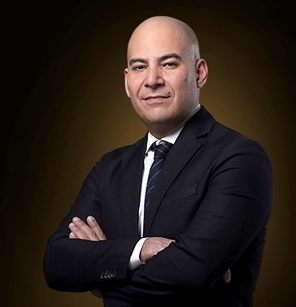
Because while working practices will undoubtedly be transformed by the advance of AI, it is in the treatment and prevention of disease that AI can have a truly transformative effect. J-Clinic will work tirelessly towards this goal.
I am personally pleased to see that through this research, Community Jameel and J-Clinic are harnessing the power of machine learning and taking the fight to cancer, Alzheimer’s, and other non-infectious diseases that affect the lives of people around the world.
But I am sure there is so much more to be done. So much more to come. Particularly in public health and infectious disease control that impacts some of the world’s most vulnerable populations and therefore, socially, politically and economically, humankind as a whole. Our journey continues.
[1] Artificial Intelligence Will Change Healthcare as We Know It, Business News Daily, 9 June 2019
[2] The AI Industry Series: Top Healthcare AI Trends To Watch, CB Insights, accessed July 2019
[3] The AI Industry Series: Top Healthcare AI Trends To Watch, CBInsights, accessed July 2019
[4] Could Artificial Intelligence Transform Healthcare? Morgan Stanley, 26 February 2019
[5] Artificial Intelligence in Healthcare, Academy of Medical Royal Colleges, January 2019
[6] Artificial Intelligence (AI): Healthcare’s New Nervous System, Accenture, 2017
[7] 3 Ways Google Is Taking Healthcare Tech to New Heights, Health Tech Magazine, 15 July 2019
[8] 3 Ways Google Is Taking Healthcare Tech to New Heights, Health Tech Magazine, 15 July 2019
[9] Artificial Intelligence in Healthcare, Academy of Medical Royal Colleges, January 2019
[10] How Is AI Used In Healthcare – 5 Powerful Real-World Examples That Show The Latest Advances, Forbes, 27 July 2018
[11] How Is AI Used In Healthcare – 5 Powerful Real-World Examples That Show The Latest Advances, Forbes, 27 July 2018
[12] A digital revolution in healthcare is speeding up, The Economist, 2 March 2017
[13] What doctor? Why AI and robotics will define New Health, PwC, June 2017
[14] Would you trust an algorithm to diagnose an illness? CNN, 15 July 2019
[15] UCLH and UCL develop AI to identify patients likely to skip appointments, University College London Hospitals Biomedical Research Centre, 15 April 2019
[16] How Is AI Used In Healthcare – 5 Powerful Real-World Examples That Show The Latest Advances, Forbes, 27 July 2018
[17] How Is AI Used In Healthcare – 5 Powerful Real-World Examples That Show The Latest Advances, Forbes, 27 July 2018
[18] Artificial Intelligence (AI): Healthcare’s New Nervous System, Accenture, 2017
[19] Could Artificial Intelligence Transform Healthcare? Morgan Stanley, 26 February 2019
[20] Artificial Intelligence (AI): Healthcare’s New Nervous System, Accenture, 2017
[21] Cryptographic protocol enables greater collaboration in drug discovery, MIT, 18 October 2018
[22] Machine-learning system could aid critical decisions in sepsis care, MIT, 7 November 2018
[23] Painting a fuller picture of how antibiotics act, MIT, 9 May 2019
[24] J-Clinic names 18 grant recipients from across Institute, MIT, 1 May 2019



 Added to press kit
Added to press kit


